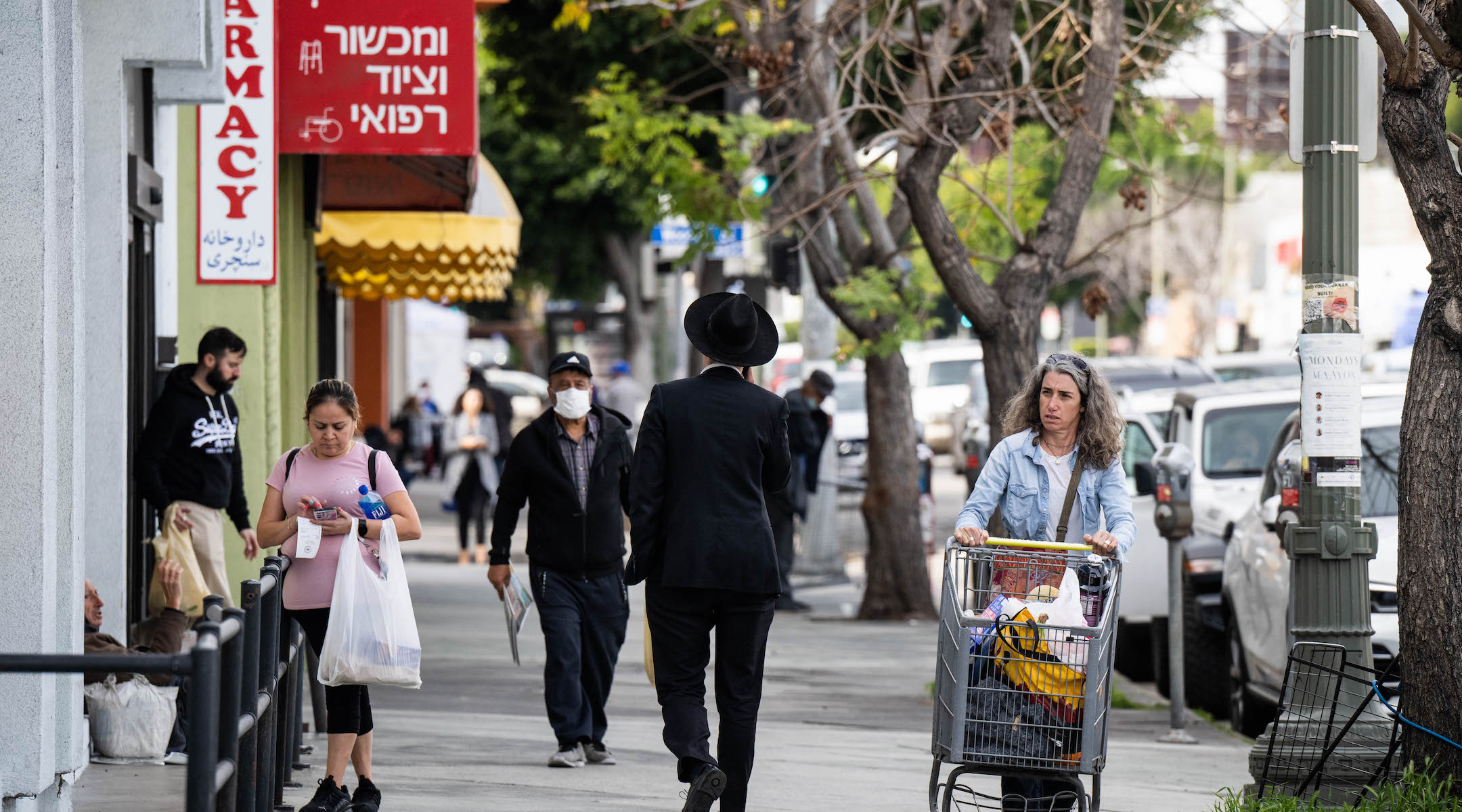California man sentenced for drive-by shooting of Jews leaving LA synagogues
Jaime Tran pled guilty to two hate crimes and was sentenced to 35 years

Police patrolled Pico-Robertson after a man was arrested for allegedly shooting two men shortly after they left prayer services.
The man who shot two Jewish men walking home from prayer services in Los Angeles last year was sentenced Monday to 35 years in federal prison, a term one of the victims told the judge was “lenient.”
Jaime Tran shot the men, from his car, on consecutive mornings in February 2023 in Pico-Robertson, a largely Orthodox enclave on the city’s Westside. Both victims sustained minor injuries and were released from the hospital the same day.
Tran told authorities after his arrest that he had stalked Pico-Robertson for targets after looking up the location of kosher markets on Yelp. He chose his victims by their yarmulkes, according to court documents.
The shootings were the highest profile incident of antisemitic violence in decades in Los Angeles, which is home to the country’s second-largest Jewish community. Authorities downplayed the possibility of an antisemitic motive in the first drive-by shooting.
Months before the shootings, Tran, who is Asian American, had sent antisemitic emails to former classmates at UCLA’s School of Dentistry, accusing Persian Jews of starting Covid. And in the days leading up to the attacks, Tran had written on an online message board, “Time to kill Jews.”
“This sentence sends a clear and unequivocal message. Hate has no place in our community. Antisemitism has no place in our community,” said U.S. Attorney Martin Estrada at a news conference following the sentencing.
Estrada noted that it was nearly one year since Oct. 7. “In standing here, we make a statement that we will not allow ourselves to be divided. We will continue to be united against hate, bigotry and animus of all types. We will not tolerate violence of any type in our community.”
The police response
More than 18 months after the attacks, questions remain about whether police could have averted a second shooting by responding differently to the first.
After the first drive-by shooting, authorities stated there was no reason to believe antisemitism was a motive and did not commit additional patrols to the neighborhood.
The second shooting of a visibly Jewish man in a dense Jewish neighborhood prompted a larger law enforcement response than the day prior’s. But the Federation reiterated that there was “no indication” either shooting was a hate crime and that authorities had informed them there was “NO known credible threat” to the LA Jewish community.
And LAPD only revealed it believed the two shootings were connected at around 5 p.m. the day of the second shooting.
It was not until after the second shooting the next morning — about two blocks from where the first had occurred — that the messaging changed.
LAPD Deputy Chief David Kowalski said Monday the department handled any shooting in the city the same way. But there was “very limited information” after the first shooting, he said.
“It wasn’t until we had that second shooting that we knew that someone had that specific purpose to hurt the Jewish community,” Kowalski said. He added that the law enforcement response was “appropriate and timely” and denied that LAPD had made any statements downplaying a possible antisemitic motive.
When Tran was arrested nearly 100 miles outside of Los Angeles, police found a rifle and a handgun in his car, both of which he had purchased illegally after failing a mental health screening.
Tran sentenced
Tran pleaded guilty to hate crimes and firearms offenses in May in an agreement that stipulated a range of 35 to 40 years in prison. Prosecutors asked for the maximum sentence, saying that every month taken off of it exposed the Jewish community to additional risk. Tran’s attorney said he was remorseful.
When Judge George Wu offered him the opportunity to address the court prior to his sentencing, Tran, his shoulder-length straight black hair obscuring his face, replied with a curt “no” before his attorney delivered remarks on his behalf. The statement shared his desire to get help and “not put anyone else in harm’s way,” but neither acknowledged nor disavowed his antisemitic motivations.
When Wu gave Tran’s first shooting victim a turn to speak, the victim — identified only by the first initial of his last name, H. — challenged the judge.
“This is a very lenient proposal that has been given,” he said. “I think 40 years is a very lenient proposal for two people’s lives.”
He added: “Has it been brought to the judge’s attention that he had a machine gun and could have caused a mass casualty event?”
Wu replied that he was aware. But he ruled in the lower range, saying Tran’s actions were mainly due to mental health issues, “which are not a justification but an explanation for why he did what he did.”
A message from our CEO & publisher Rachel Fishman Feddersen
I hope you appreciated this article. Before you go, I’d like to ask you to please support the Forward’s award-winning, nonprofit journalism during this critical time.
We’ve set a goal to raise $260,000 by December 31. That’s an ambitious goal, but one that will give us the resources we need to invest in the high quality news, opinion, analysis and cultural coverage that isn’t available anywhere else.
If you feel inspired to make an impact, now is the time to give something back. Join us as a member at your most generous level.
— Rachel Fishman Feddersen, Publisher and CEO